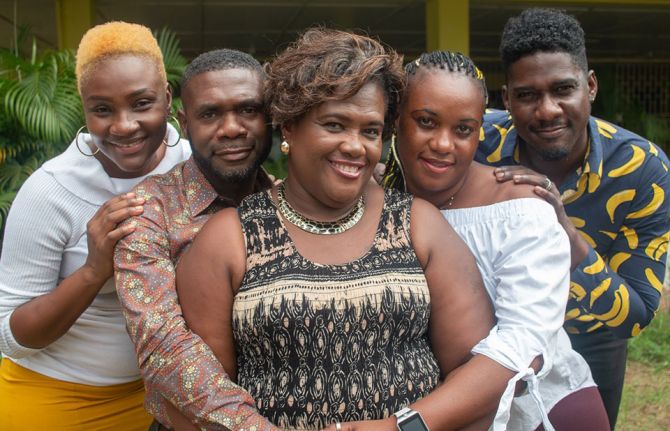



Feature Story
Jamaica partnership works to promote human rights
07 June 2021
07 June 2021 07 June 2021HIV outcomes rely on far more than the availability of services or treatment.
According to the 2020 Jamaica People Living with HIV Stigma Index, more than one third (38%) of respondents delayed HIV testing due to fears about how others would respond if they received a positive diagnosis. And 30% were slow to start treatment because of concerns that people might learn about their status.
Many of those fears are founded.
Almost half of the study’s respondents (48%) had experienced stigma or discrimination related to their HIV status. Members of key population communities reported even higher rates of prejudice and worse mental health than other people living with HIV.
“More needs to be done to get those living with HIV, and communities impacted by HIV, to live in a country and society where they are accepted and appreciated. That will also make their health outcomes better,” said Jumoke Patrick, the Executive Director of the Jamaica Network of Seropositives.
To accelerate progress towards that goal, in 2020 Jamaica became one of the first countries to join the Global Partnership for Action to Eliminate all Forms of HIV-Related Stigma and Discrimination. The initiative combines the power of governments, civil society, donors, academia and the United Nations. It reaches beyond the health sector to address ignorance and bias in education, the workplace, the justice system, families and communities.
On 4 June, the Jamaica Partnership to Eliminate HIV-Related Stigma and Discrimination launched its first annual report, Enabling environment and human rights.
The State Minister in the Health and Wellness Ministry and Chair of the Partnership, Juliet Cuthbert Flynn, reiterated the government’s commitment to addressing the social and legal issues that are barriers to an effective HIV response. She called for political leadership across party lines to recognize their role in helping to create an enabling environment.
“This is an imperative as we strive to allow every individual—regardless of their occupation, socioeconomic status, sexual orientation, gender identity, age, health status, disability and other status—to enjoy their human rights,” Ms Cuthbert Flynn said.
“We strongly believe that AIDS in Jamaica is not over, but it can be,” said the UNAIDS Country Director for Jamaica, Manoela Manova,
She noted that the new UNAIDS report, Global commitments, local action, showed that while dozens of countries had achieved the 2020 targets, many, including Jamaica, are entirely off track.
“HIV remains driven by inequality. The countries with progressive laws and policies as well as strong and inclusive community and health systems have the best outcomes. New HIV infections and AIDS-related deaths reduce faster. That is what we would like to achieve for Jamaica,” Ms Manova said.
Jaevion Nelson, a UNAIDS consultant, detailed the achievements of stakeholders in the national HIV response in Jamaica. A national human rights public education campaign was led by the National Family Planning Board. Sensitization exercises were conducted with police and correctional officers, health-care workers and faith leaders and congregants. People living with HIV received legal support, with several securing resolutions such as being reinstated in their jobs and receiving settlement costs. A National Transgender Health Strategy was launched, and nongovernmental organizations collaborated to develop model antidiscrimination legislation.
The next steps for the initiative include strengthening monitoring, evaluation and learning for its human rights agenda, increasing the engagement of legislators and creating a more sustainable framework for sensitizing health-care workers, law enforcement officers and other duty-bearers.
The UNAIDS Deputy Executive Director, Programme, Shannon Hader, delivered the feature address at the virtual event. “Societal enablers and HIV outcomes are linked,” she said. “We will only end AIDS if we strive to respect, protect and promote the rights of everyone, everywhere. It is the evidence-based thing to do.”



